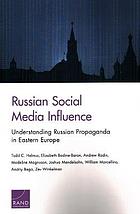In a new book, Matteo Renzi, the former Italian prime minister, says he called President Vladimir V. Putin of Russia about false news reports attacking him on the international Russian television network RT. In two hours, the story was changed, the New York Times reports:
In his book, Mr. Renzi suggests that the RT episode and the spreading of disinformation on social media raise “questions that a mature democracy needs to ask itself to avoid underestimating a crucial topic in our time: How do we regulate social-media connected phenomena?”
Russia has developed a “political algorithm” which allows it to exploit the volatility seen in Western democracies, says an influential Kremlin aide. “Russia is playing with the West’s minds,” writes Vladislav Surkov (see above). “They don’t know how to deal with their own changed consciousness.”
Russia is strong because it has rejected Western notions and democratic institutions that only give an “illusion of choice,” he added. Predicting a “glorious century” for Vladimir Putin’s political system, Surkov said the world had yet to see peak Putinism but even adversaries would end up copying his system.
“Putinism is the ideology of the future,” he claimed, adding that Russia’s anti-globalist emphasis on national sovereignty is getting traction worldwide. “The Russian-made political system is not only good for home, it has a significant export potential.” Putinism had “longevity built in” because it was native, “organic” and had survived several shock tests.
Because there is no book entitled “Putinism” [although there is!] many have convinced themselves that the Putin regime functions without an ideology, notes analyst Paul Goble. But Surkov’s latest essay in Nezavisimaya gazeta shows that it exists and that it is extremely dangerous, he writes for the Eurasia Review.
 Russian commentator Aleksandr Skobov finds that Surkov’s text confirms three theses, he adds:
Russian commentator Aleksandr Skobov finds that Surkov’s text confirms three theses, he adds:
- First, the Putin regime does have an ideology, even though it has not been formulated by “the nominal head of the regime” and is not contained in books labelled as such.
- Second, “the ideology of the Putin regime is a variety of fascism.” That Putin has not fully implemented his ideology does not change things.
- And third, “the global pretensions of the Putin regime are the destruction of liberal democracy as a social-political model in the entire world and its ‘exit from history.’”
These three things mean that “liberal democracy can defend itself only by forcing the Russian imperial state to ‘exit from history,’” Skobov concludes. [Surkov’s notion of “managed democracy” is discussed in the National Endowment for Democracy’s Journal of Democracy here].
Far from being the ideological monolith often described by Western pundits, the Russian regime nurtures ideological diversity, Marlène Laruelle argues in Russian Nationalism: Imaginaries, Doctrines and Political Battlefields. She explores the different ideological “ecosystems” that co-exist and compete for resources and attention in today’s Russia. At a forthcoming Kennan Center seminar, she will discuss the place of Russian nationalists and how they interact within these intellectual ecosystems, as well as with the Kremlin itself.
Speaker: Marlène Laruelle, Associate Director and Research Professor, Institute for European, Russian and Eurasian Studies, Elliott School of International Affairs; Director, Central Asia Program, The George Washington University; Co-Director of PONARS.
February 21. 3:00pm — 4:00pm
5th Floor, Woodrow Wilson Center
Washington, DC.







